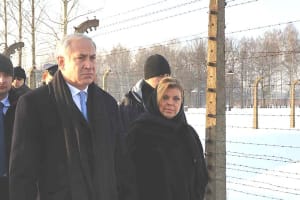Claims Conference new initiative connects Holocaust survivors with students to combat rising antisemitism

The New York-based "Conference on Jewish Material Claims Against Germany" launched a new initiative on Thursday as part of an international effort to connect more than 250 Holocaust survivors with students around the world.
The "Claims Conference" brings together Holocaust survivors and students, either in-person or virtually, where survivors can share their stories of loss and survival with students around the world amid the surge of global antisemitism following the devastating Oct. 7 Hamas attack on Israel that triggered the war in the Gaza Strip.
“A Holocaust survivor speakers bureau of this scale and reach is unprecedented,” said Gideon Taylor, president of the Claims Conference. “At a moment of dramatically rising antisemitism, this program tells the history and educates for the future.”
Educators across the United States and Germany will be able to invite survivors to speak directly in classrooms and lecture halls, with other countries offering video conferences for firsthand testimonies. Claims Conference coordinators hope to soon expand in-person meetings to more nations.
“Holocaust education is crucial, especially given the current events happening around the world,” said Holocaust survivor Eva Szepesi, who lives in Germany.
“My goal in sharing my own story of survival is and has always been to show the human impact, not just of the Holocaust, but of all the racist and hateful actions being taken in the world,” added the 91-year-old survivor of the Auschwitz death camp.
“If hearing my testimony helps one person understand that they, too, have a role in the events happening in their community, and they can stand up for what is right, then I feel it is worth it for me to go remember and share those terrible stories.”
According to reports from The Anti-Defamation League, antisemitism has increased by 400% in the U.S. since the war in Gaza began last fall and has reached levels in Germany and other European countries that haven’t been seen in decades.
The Claims Conference aims to provide students access to first-person accounts of the horrors endured during the Holocaust will help counter disinformation, denial and prejudice.
“Firsthand accounts are essential to maintaining Holocaust memory and go much further to ensure people understand the impact of bigotry, antisemitism, and unchecked hatred,” said Greg Schneider, vice president of the initiative.
The Claims Conference works on behalf of Jews who suffered under the Nazis and negotiates compensation with Germany’s finance ministry every year. Since 1952, the German government has paid more than $90 billion to individuals for the suffering and losses they endured as a result of the persecution in Nazi Germany.
The group administers several compensation programs that provide direct payments to survivors globally. They also provide grants to more than 300 social service agencies worldwide to ensure survivors have access to home care, food, medicine, transportation and socialization.
As the number of Holocaust survivors shrinks each year, the Claims Conference continues to secure and increase funding for Holocaust education. Funding has increased from 30 million euros ($32.5 million) in 2024 to 41 million euros ($44 million) in 2027.
Six million European Jewish men, women and children and nearly half a million non-Jews from other minority groups were killed by Nazis and their collaborators during the Holocaust.
According to The Jerusalem Post, in 2020, the Claims Conference conducted a survey of 1,000 respondents across 50 states about their level of Holocaust education.
The survey showed that 11% of respondents believe Jews are responsible for the Holocaust, 15% said they thought the Holocaust was a myth or has been exaggerated, and 20% said people talk about it too much. Nearly half said they had seen examples of Holocaust denial online.
The poll also showed there was little correlation between state education requirements about the Holocaust and Holocaust knowledge. According to the Post, none of the 10 states with the highest knowledge levels required Holocaust education in high schools, while three states in the bottom 10 - Delaware, New York and Florida - mandated it. The poll noted that the knowledge levels, as defined by the survey, were based on whether respondents had heard of the Holocaust, knew six million Jews were killed and could name a concentration camp or ghetto.
Holocaust knowledge was particularly low in New York, despite the state having the largest population of Jews in the country. Most respondents there could not name a single Nazi camp or ghetto, and 28% said they believed the Holocaust was a myth or has been exaggerated. Wisconsin had the highest knowledge score at 44%, while Arkansas had the lowest at 17%.
“Not only was their overall lack of Holocaust knowledge troubling, but combined with the number of Millennials and Gen Z who have seen Holocaust denial on social media, it is clear that we must fight this distortion of history and do all we can to ensure that the social media giants stop allowing this harmful content on their platforms,” Schneider said in a statement.
“Survivors lost their families, friends, homes and communities; we cannot deny their history.”

The All Israel News Staff is a team of journalists in Israel.
You might also like to read this:
















